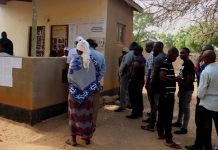THE government will soon conduct a thorough scrutiny on Cooperative Unions and Agricultural Marketing Cooperative Societies (AMCOS) leaders in the country in bid to rid the institutions of unqualified and non-committed leaders, it has been disclosed.
Agriculture Deputy Minister, Mr Omary Mgumba disclosed this information today morning when he paid a courtesy call and held discussions with Kagera Regional Commissioner (RC), Brig Gen Marco Gaguti.
“We are in the process to conduct a national exercise on Cooperative Unions and AMCOS to know the exact qualifications of the leaders. The exercise will rid the institutions of unqualified and non-committed leaders. Almost in every corner the farmers were complaining of rampant thefts in Cooperative Unions and AMCOS and the complaints covered all crops including coffee, cotton, tea, sugar and cashew nut,” he said.
The Deputy Minister emphasised on the need to separate cooperative management to business management.
“Some of the unfaithful cooperative leaders have been mixing the two issues for personal gains. This is quite wrong. Cooperatives should be conducted transparently and should not be part of business issues because the institutions should benefit the farmers,” he said.
He explained that Kagera Region was in the past a shining example in running cooperatives but wondered what had happened…adding…we want to revive the lost glory. He refuted reports that private companies had been barred from buying coffee in Kagera Region.
“These rumours are unfounded. Private companies are allowed to participate in coffee auction, but they should follow the laid down regulations,” he said.
He appealed to District Councils in the country and stakeholders to conduct a campaign aimed to sensitize people and increase consumption of locally produced foods.
“While Ethiopia, the leading coffee producer in Africa boasts of about 50 per cent in local coffee consumption, Tanzania has just five per cent. We should all take part in this campaign to sensitize people to consume locally produced foods including coffee,” he said.
Coffee is Tanzania’s largest export crop. It contributed some $112 million to the country’s export earnings in 2007/2008 and accounts for about 20 per cent of Tanzania‘s foreign exchange earnings.
Coffee has been the mainstay of the country‘s agriculture-based economy since its introduction as a cash crop around 100 years ago.
Coffee production is concentrated in five main geographic areas of Tanzania, in the north (Kilimanjaro, Arusha and Tarime), in the west (Kigoma and Kagera) and south (Mbeya Iringa and Ruvuma).
Tanzanian Coffee Board (TCB) estimates that over 400,000 households, with an average area of 0.5 -1.0 hectare, are responsible for 95 per cent of the coffee production with the balance produced by over 110 estates.
An estimated 2,000,000 additional people are employed either directly or indirectly in the industry. Tanzania produced about 42,000 tons in 2007/2008 and for the past 15 years or so coffee production in Tanzania showed varying trends. Since the mid-1990s, the country‘s coffee industry has been in a state of stagnation or decline.
Coffee production moderately declined from the early 1990s to 1998 after which it gradually increased until 2003.
Coffee area expanded significantly during the 1970s and 1980s when prices were more favorable but declined thereafter.
From 1980/81 to 1998/99 coffee sales (equivalent to total output) declined from 61,514 tons to 41,578 tons.
TCB estimates that 275,000 hectares are under coffee cultivation, large private estates can yield up to 2500kg/ha with irrigation and fertilizers, while smallholders average 300kg/ha.







